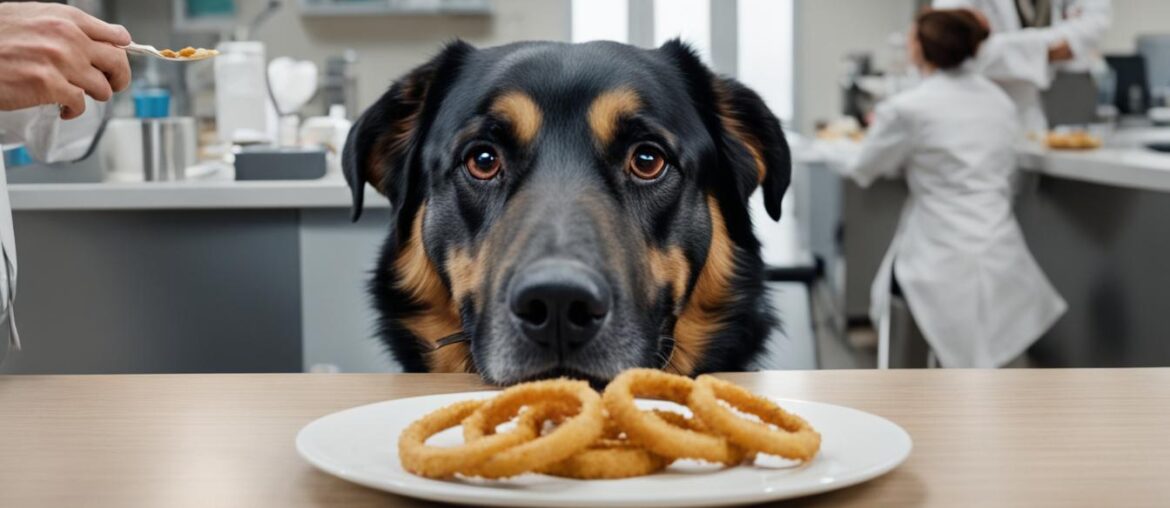As a dog owner, you may find yourself wondering if it’s safe to share your favorite snacks, such as onion rings, with your furry friend. While it’s tempting to want to treat your dog to a taste of your meal, it’s essential to understand the potential risks involved.
Onions are commonly found in many dishes, including onion rings, but they can be harmful to dogs. The compound N-propyl disulfide in onions can cause a breakdown of red blood cells, leading to anemia in dogs. This means that even a small amount of onion can have toxic effects on your pet.
Key Takeaways:
- Onions are toxic to dogs due to the compound N-propyl disulfide.
- All parts of the onion plant, including the flesh, leaves, juice, and processed powders, are harmful to dogs.
- Symptoms of onion toxicity in dogs include anemia, vomiting, elevated heart rate, and panting.
- If your dog consumes onions, it is crucial to seek veterinary attention as soon as possible.
- Safe alternatives for dogs to enjoy include vegetables like carrots, cucumbers, and green beans.
Are Onions Toxic to Dogs?
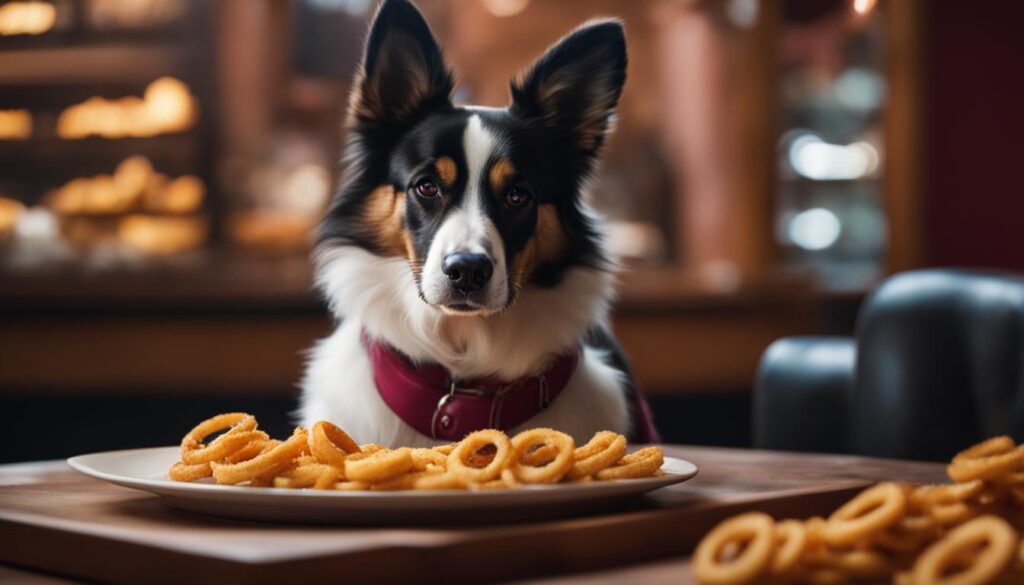
Yes, onions are indeed toxic to dogs. They contain a compound called N-propyl disulfide, which is a toxin that can cause the breakdown of red blood cells in dogs, leading to anemia. The toxin attaches to the oxygen molecules in the red blood cells, impairing their ability to carry oxygen and causing oxidative damage.
All parts of the onion plant, including the flesh, leaves, juice, and processed powders, contain this toxin and should be avoided in a dog’s diet. Even small amounts of onion can be harmful to dogs, and onion powder is particularly potent in its toxicity.
If a dog consumes onions, it can have serious consequences for their health. Symptoms of onion toxicity in dogs include anemia, vomiting, elevated heart rate, and panting. It is important to seek veterinary attention as soon as possible if your dog exhibits these symptoms after consuming onions.
As responsible pet owners, it is crucial to understand the dangers of onions to dogs and take the necessary precautions to keep them safe. Avoid feeding your dog any food that contains onions, including onion rings or dishes that contain onions as an ingredient.
To summarize:
- Onions are toxic to dogs due to the presence of N-propyl disulfide.
- All parts of the onion plant are harmful to dogs, including the flesh, leaves, juice, and processed powders.
- Even small amounts of onion can be toxic to dogs.
- Symptoms of onion toxicity in dogs include anemia, vomiting, elevated heart rate, and panting.
Keep your furry friend safe by avoiding onions and opting for other safe and healthy alternatives in their diet.
What Parts of Onions are Toxic to Dogs?
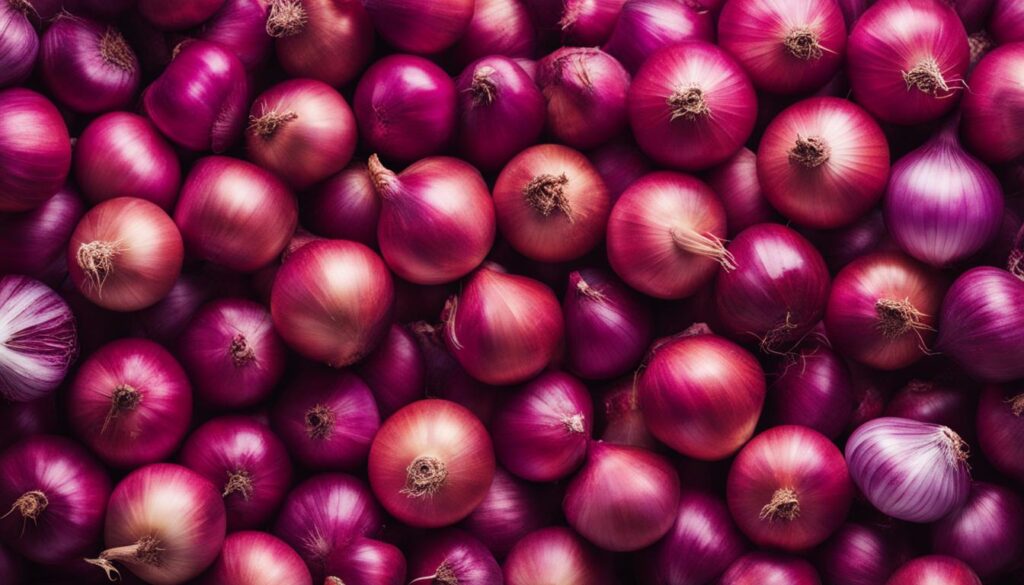
All parts of the onion plant, including the flesh, leaves, juice, and processed powders, are toxic to dogs. This includes raw or cooked onions, fried onions, and onion powder. Even small amounts of onion can have toxic effects on dogs. In fact, just one medium-to-large onion is enough to reach dangerous toxicity levels for a 45-pound dog. It is crucial to keep in mind that dogs are not the only pets affected by onions; cats are even more sensitive to the toxic properties of onions, so it is important to keep onions away from both feline and canine companions.
If you are unsure whether a food item contains onions or onion powder, it is essential to read the labels carefully. Onion powder is commonly used as an ingredient in various foods, including condiments, seasoning blends, and processed snacks. Checking the ingredients beforehand will help ensure that your dog is not exposed to this harmful ingredient.
To provide a visual representation of the harmful parts of onions for dogs, below is a table summarizing the different onion components that can be toxic to dogs:
| Parts of Onions | Toxicity to Dogs |
|---|---|
| Flesh of Onions | Highly toxic |
| Leaves of Onions | Highly toxic |
| Onion Juice | Highly toxic |
| Processed Powders (e.g., Onion powder) | Highly toxic |
Above all, it is essential to remember that preventing onion toxicity is better than treating it. By eliminating all forms of onions from your dog’s diet, you can help ensure their health and well-being.
Symptoms of Onion Toxicity in Dogs
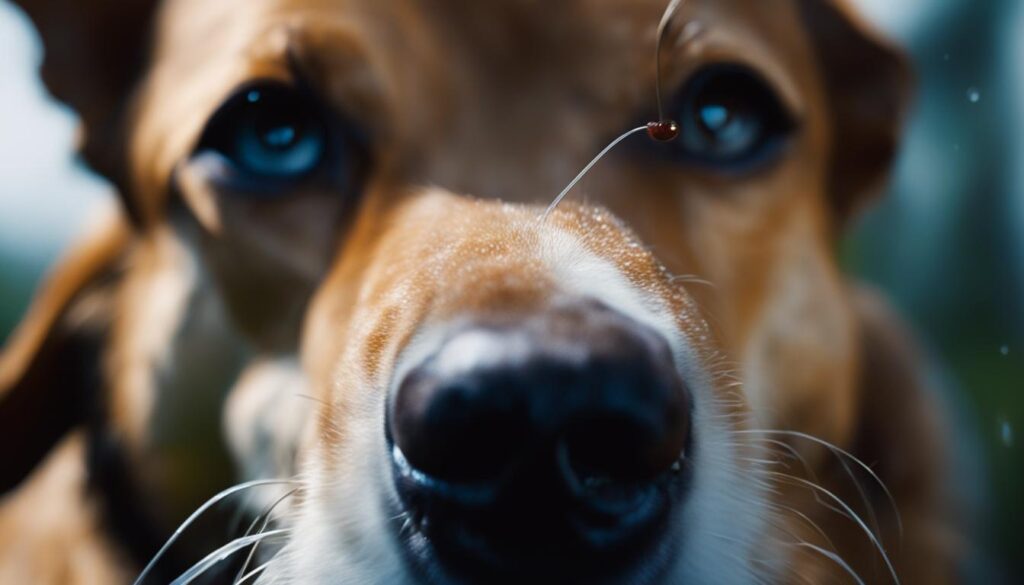
When dogs consume onions, they can experience various symptoms of onion toxicity. It is crucial for dog owners to be aware of these signs and seek veterinary attention promptly if they suspect their dog has ingested onions.
Anemia
Anemia is one of the primary symptoms of onion toxicity in dogs. It occurs due to the breakdown of red blood cells caused by the compound N-propyl disulfide found in onions. The reduced levels of red blood cells can lead to weakness, pale gums, and decreased energy in dogs.
Vomiting
Another common symptom of onion toxicity is vomiting. If a dog has consumed onions, their body may attempt to eliminate the toxic compounds by inducing vomiting. If the vomiting persists or is accompanied by other symptoms, it is crucial to seek veterinary care.
Elevated Heart Rate
Dogs affected by onion toxicity may also exhibit an elevated heart rate. The toxic compounds in onions can affect the cardiovascular system, causing an increased heartbeat. This symptom can be an indication of significant onion toxicity and should not be ignored.
Panting
Panting is a frequent symptom observed in dogs suffering from onion toxicity. The toxic effects of onions on the body can cause dogs to pant excessively as they attempt to regulate their body temperature and cope with the adverse effects of the toxins.
If you notice any of these symptoms in your dog after they have consumed onions, it is crucial to seek veterinary attention immediately. A veterinarian will be able to diagnose the condition based on the dog’s symptoms and perform necessary blood work to confirm onion toxicity. Prompt diagnosis and treatment are essential to ensure the well-being and recovery of your beloved pet.
| Symptoms of Onion Toxicity in Dogs | Signs |
|---|---|
| Anemia | – Weakness |
| – Pale gums | |
| – Decreased energy | |
| Vomiting | – Frequent episodes of vomiting |
| Elevated Heart Rate | – Increased heart rate |
| Panting | – Excessive panting |
Treating Onion Toxicity in Dogs
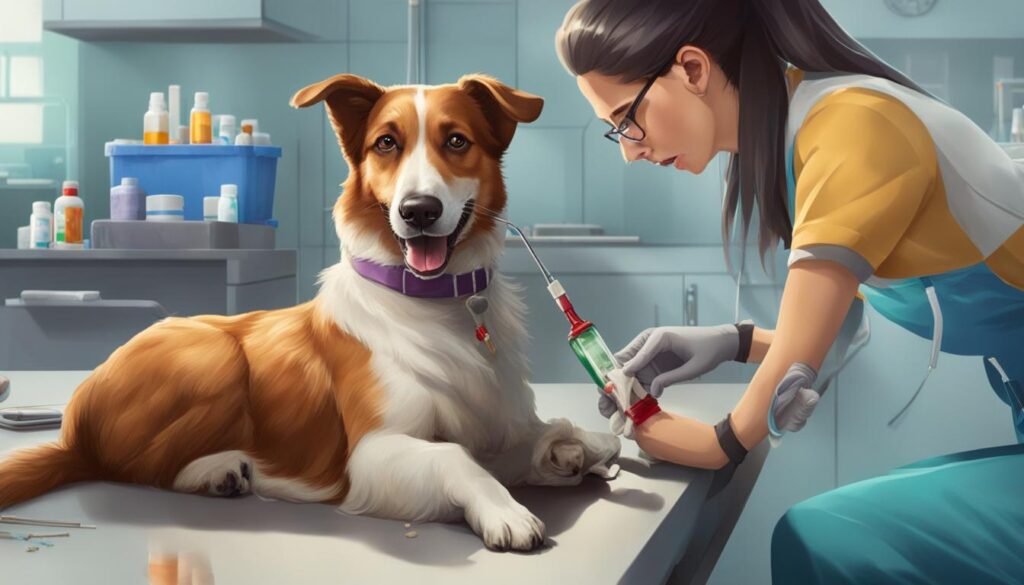
The best way to treat and prevent onion toxicity in dogs is to never allow them to consume onions. If a dog has ingested onions and is experiencing toxic effects, veterinary attention is necessary. Treatment may involve inducing vomiting if the onions were recently consumed, providing supportive care to replace damaged red blood cells, and in severe cases, a blood transfusion may be required. The faster the dog receives veterinary care, the better their chances of recovery. To prevent onion poisoning from recurring, it is important to keep onion dishes and foods out of a dog’s reach.
In cases of onion toxicity in dogs, prompt and appropriate treatment is crucial. If onions were recently consumed, the veterinarian may attempt to induce vomiting to eliminate the toxins from the dog’s system. This can help prevent further absorption of the toxins and reduce the severity of symptoms. However, inducing vomiting should always be done under veterinary supervision to ensure the safety of the dog.
In addition to inducing vomiting, supportive care is essential in treating onion toxicity. This may involve providing intravenous fluids to flush out the toxins and help the dog’s body recover. Blood transfusions may be necessary to replace damaged red blood cells and improve the dog’s oxygen-carrying capacity.
It is important to note that the specific treatment plan may vary depending on the severity of the onion toxicity and the dog’s overall health. A veterinarian will assess the dog’s condition and tailor the treatment accordingly for the best possible outcome.
Prevention is always the best approach when it comes to onion toxicity in dogs. Keeping onions and onion-containing foods out of a dog’s reach is crucial to avoid accidental ingestion. It is also essential to educate yourself and your family members about the dangers of onions to dogs, especially if you have a habit of sharing human food with your furry companion.
If you suspect that your dog has consumed onions or is exhibiting symptoms of onion toxicity, do not hesitate to seek veterinary attention. Early intervention can greatly improve the chances of successful treatment and recovery. Remember, the well-being of your canine companion is always a top priority, and taking the necessary precautions and seeking professional help is key to keeping them safe and healthy.
Why Can’t Dogs Eat Onions?
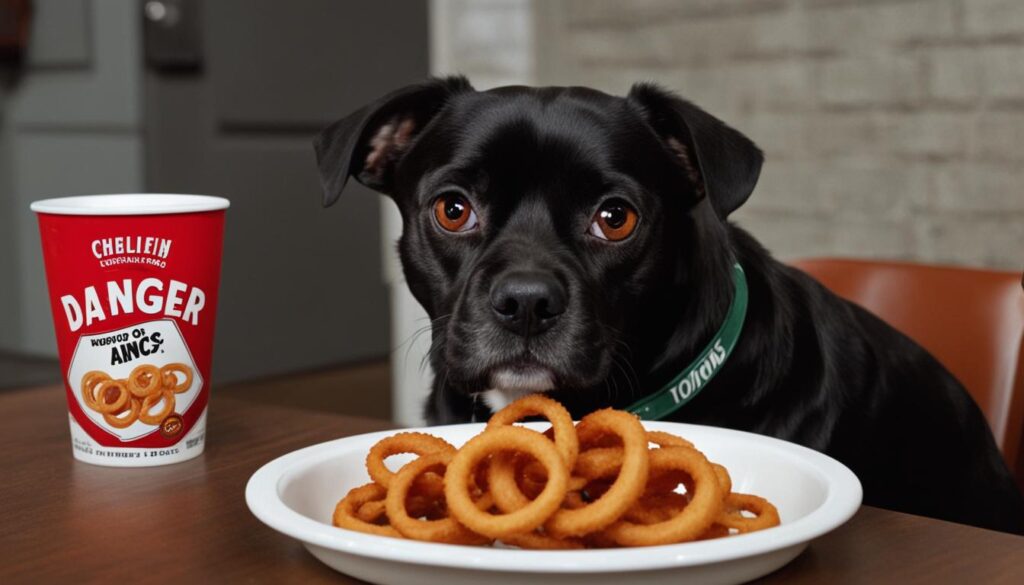
Onions are unsafe for dogs due to the presence of organosulfur compounds, which can cause oxidative damage in their bodies. These compounds are particularly harmful to dogs and cats, with the majority of the damage occurring to red blood cells. When dogs consume onions, they can develop a condition called hemolytic anemia, where the red blood cells are destroyed at a faster rate than the body can produce new ones. This can lead to a decrease in the oxygen-carrying capacity of the blood, resulting in weakness, pale gums, and decreased energy.
In addition to affecting red blood cells, onions can also have detrimental effects on other organs such as the liver and kidneys. The toxic compounds in onions can cause damage to these vital organs, leading to potential long-term health issues. Furthermore, onions can irritate the lining of the intestines, causing pain and diarrhea in dogs.
Given the dangers onions pose to dogs, it is crucial to avoid feeding them any form of onion, including onion rings. Even small amounts of onions can have toxic effects on dogs, making it essential to be vigilant about keeping onions and onion-containing foods out of their reach. Instead, opt for safe and healthy alternatives such as carrots, cucumbers, and green beans to provide your canine companion with a nutritious and enjoyable diet.
By understanding why dogs can’t eat onions and taking proactive measures to prevent their consumption, you can ensure the well-being and longevity of your furry friend.
How Much Onion Can Kill a Dog?
The amount of onion that can be toxic to a dog depends on their size. Consuming more than 0.5% of their body weight in onions can lead to toxicity. It’s essential to be cautious as even small amounts of onion can be potentially harmful to a dog’s health.
For example:
- A small dog weighing less than 10 pounds should not consume more than 1/10 of a medium-sized onion.
- A large dog weighing less than 60 pounds should not consume more than 2/3 of a medium-sized onion.
It’s safer to assume that any amount of onion can be toxic to dogs. Therefore, it’s best to avoid feeding them onions altogether.
What to Do if Your Dog Eats Onions

If your dog ingests onions, it is crucial to take immediate action. Firstly, prevent your dog from consuming any further onion or onion products. Clean up any spills and remove any accessible onion-containing foods. Calculate how much onion your dog has eaten and take note of when it happened. Contact your veterinarian for advice and provide them with the necessary information. Depending on the situation, they may suggest inducing vomiting if the onions were recently consumed or may recommend bringing your dog in for an examination. It is important not to try and treat onion toxicity at home without professional guidance.
What Happens if a Dog Eats Onions?
If a dog consumes onions, the effects may not be immediate. Symptoms of onion toxicity may appear within 1 to 3 days after ingestion. It is essential to be aware of these consequences as they can have a significant impact on a dog’s health.
Some of the effects of onion consumption in dogs include:
- Vomiting: Dogs may experience recurrent episodes of vomiting as their bodies react to the toxic compounds present in onions.
- Diarrhea: Onions can irritate a dog’s gastrointestinal system, leading to diarrhea and loose stools.
- Weakness: Dogs may exhibit signs of weakness and decreased energy levels due to the disruption of red blood cell function caused by onion toxicity.
- Pale Gums: The destruction of red blood cells can result in anemia, causing the gums to appear pale or white instead of their usual pink color.
- Loss of Appetite: Onion toxicity can lead to a loss of appetite in dogs, causing them to refuse food or eat significantly less than usual.
- Increased Heart Rate: Dogs may have an elevated heart rate as their bodies try to compensate for the decreased oxygen-carrying capacity of damaged red blood cells.
The consumption of onions can also have long-term consequences. The toxic compounds in onions can damage and destroy red blood cells, potentially resulting in anemia. This condition can impact the overall health of the dog and may also affect the liver and kidneys. It is crucial to seek immediate veterinary help if your dog has consumed onions to prevent severe complications and potential fatality.
Can Onion Poisoning in Dogs be Treated?
If onion poisoning is suspected or confirmed, prompt veterinary action is vital. If the onions were consumed within the past 4 hours, the veterinarian may induce vomiting to eliminate the toxins. Supportive therapy, such as IV fluids, may also be administered to assist the body in flushing out the toxins and replacing damaged red blood cells. Blood tests may be conducted to assess the extent of red blood cell damage and potential liver and kidney issues. Treatment for onion poisoning is generally successful if enacted early and can prevent severe outcomes.
Treatment Options for Onion Poisoning in Dogs
| Treatment | Description |
|---|---|
| Inducing vomiting | If onions were recently consumed, vomiting may be induced to eliminate toxins from the body. |
| Supportive therapy | Administering IV fluids to flush out toxins and replace damaged red blood cells. |
| Blood tests | Conducting blood tests to assess red blood cell damage and potential liver and kidney issues. |
Wrapping Up
In conclusion, it is important to remember that onions are toxic to dogs and should never be included in their diet. The compound N-propyl disulfide found in onions can cause serious health complications, such as hemolytic anemia, in dogs. Even small amounts of onions can be harmful, so it’s essential to keep all parts of the onion plant, including onion rings, away from dogs.
Fortunately, there are plenty of safe and healthy alternatives that you can offer your furry friend. Vegetables like carrots, cucumbers, and green beans are excellent options to include in their diet as a substitute for onions. These alternatives provide essential nutrients without the risk of toxicity.
If you suspect that your dog has ingested onions and is showing symptoms of toxicity, it is crucial to seek veterinary care immediately. A qualified veterinarian will be able to provide a proper diagnosis and administer the necessary treatment. Remember, early intervention is key to preventing severe complications and ensuring your dog’s well-being.
By being cautious about your dog’s diet and avoiding harmful foods like onions, you can safeguard their health and prevent onion poisoning. Always prioritize their safety and provide them with safe human food options that are suitable for their dietary needs.
FAQ
Can dogs eat onion rings?
No, dogs should not eat onion rings. Onions are toxic to dogs and can cause serious health issues, including anemia. It is best to keep all parts of the onion plant away from dogs to ensure their well-being.
Are onions toxic to dogs?
Yes, onions are toxic to dogs. The compound N-propyl disulfide found in onions can cause the breakdown of red blood cells and lead to anemia in dogs. All parts of the onion plant, including the flesh, leaves, juice, and processed powders, contain this toxin and should be avoided in a dog’s diet.
What parts of onions are toxic to dogs?
All parts of the onion plant, including the flesh, leaves, juice, and processed powders, are toxic to dogs. Even small amounts of onion can have toxic effects, and onion powder is particularly potent. It is important to keep all onion products away from dogs to prevent onion toxicity.
What are the symptoms of onion toxicity in dogs?
The symptoms of onion toxicity in dogs can include anemia, vomiting, elevated heart rate, and panting. Other symptoms may also include weakness, pale gums, loss of appetite, and diarrhea. If your dog exhibits these symptoms after consuming onions, seek veterinary attention immediately.
How is onion toxicity in dogs treated?
If a dog has ingested onions and is experiencing toxic effects, veterinary attention is necessary. Treatment may involve inducing vomiting, providing supportive care to replace damaged red blood cells, and in severe cases, a blood transfusion may be required. Seeking prompt veterinary care is essential for a dog’s recovery.
Why can’t dogs eat onions?
Dogs cannot eat onions because they contain a compound called N-propyl disulfide, which is toxic to dogs. This compound causes the breakdown of red blood cells, leading to anemia. Onions can also affect the lining of the intestines and potentially impact the liver and kidneys of dogs.
How much onion can kill a dog?
The amount of onion that can be toxic to a dog depends on their size. As a general guideline, consuming more than 0.5% of their body weight in onions can lead to toxicity. Even small amounts of onion can be potentially harmful to a dog’s health.
What should I do if my dog eats onions?
If your dog ingests onions, prevent them from consuming any further onion or onion products. Clean up any spills and remove any accessible onion-containing foods. Contact your veterinarian for advice and provide them with the necessary information. It is important not to try and treat onion toxicity at home without professional guidance.
What happens if a dog eats onions?
If a dog eats onions, they may experience symptoms of toxicity within 1 to 3 days. These symptoms can include vomiting, diarrhea, weakness, pale gums, loss of appetite, and increased heart rate. The red blood cells may be damaged and destroyed, leading to anemia and potentially impacting the liver and kidneys. Seeking veterinary help is crucial in such cases.
Can onion poisoning in dogs be treated?
Yes, onion poisoning in dogs can be treated. If the onions were recently consumed, the veterinarian may induce vomiting to eliminate the toxins. Supportive therapy, such as IV fluids, may also be administered to assist the body in flushing out the toxins and replacing damaged red blood cells. Seeking prompt veterinary care increases the chances of successful treatment.
Can dogs eat onion rings?
No, dogs cannot eat onion rings or any part of the onion plant. Onions are toxic to dogs and can cause serious health issues, including anemia. It is best to provide dogs with safe and healthy alternatives such as carrots, cucumbers, and green beans.


